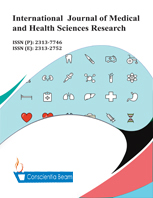Prevalence of Prehypertension and Assessment of Renal Function among the Prehypertensive Students of the College of Health Sciences, Nnamdi Azikiwe University, Nnewi, Anambra State, Nigeria
DOI:
https://doi.org/10.18488/journal.9.2017.45.73.87Abstract
This study was carried out to determine the prevalence of pre-hypertension and assess the renal function in pre-hypertensive students in College of Health Sciences, Okofia, Nnewi. A total of 210 (99 males and 111 females) apparently healthy respondents aged 18-28, were recruited for the initial screening. Their blood pressure readings and body mass index (BMI) were obtained, whereas 5mls of blood sample was collected from 18 prehypertensive and 19 normotensive subjects. 5mls of blood was collect from eligible subjects and dispensed in plain containers for estimation of biochemical parameters. Serum creatinine, urea, Na+, K+, and Cl- were analyzed using standard methods. Result showed a prevalence of 11.4% with a higher percentage in males (12.12%) than in female (10.81%). BMI was significantly higher in pre-hypertensive than in normotensive (26.31±4.76 Vs 21.60±2.44;p> 0.05). Systolic (SBP) and diastolic (DBP)(126.67±5.76 Vs 107.68±9.90; 79.56±6.57 Vs 69.52±7.39;p> 0.05) respectively were significantly higher in prehypertensives than in normotensives. Interestingly, there was no significant difference in the value of renal function markers of the prehypertensives when compared to normotensives (p>0.05). However, there was a positive correlation between SBP and serum urea level(r = 0.628; P =0.009). Therefore, the prevalence of prehypertension in this population was low with reference to studies in other populations. Importantly, this preliminary study did show that the renal functions are not compromised.

